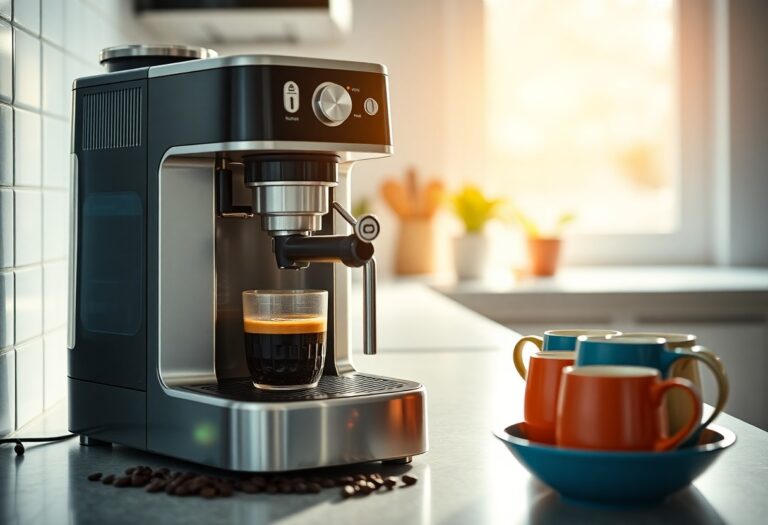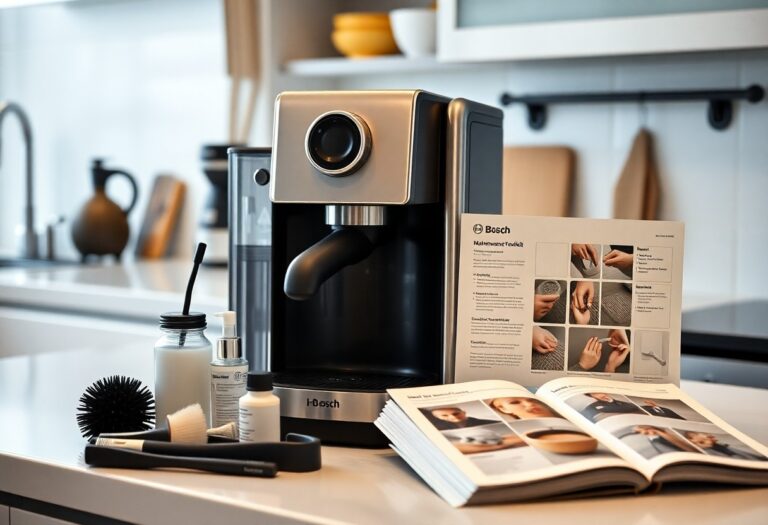What is Descale on a Coffee Machine – Function Explanation
It’s vital to understand that descaling your coffee machine is a vital maintenance step that ensures the longevity and efficiency of your appliance. Over time, minerals from water accumulate and can lead to malfunctioning or poor coffee quality. By descaling, you remove these deposits, improving your machine’s performance and enhancing the flavor of your brew. To learn more about how descaling differs from general cleaning, check out What’s The Difference Between Descaling and Cleaning A ….

Key Takeaways:
- Descaling is the process of removing mineral build-up, such as limescale, from the internal components of a coffee machine.
- Regular descaling helps maintain optimal performance, ensuring consistent brewing temperatures and improved coffee flavor.
- Descale solutions are typically composed of citric acid or other safe, effective chemicals specifically designed for this purpose.
- The frequency of descaling varies depending on water hardness and how often the machine is used, generally recommended every 1-3 months.
- Many modern coffee machines feature built-in descaling alerts to remind users when it’s time to perform this maintenance task.
The Chemistry of Scaling: How Mineral Buildup Affects Your Brew
The process of scaling occurs when water evaporates, leaving behind minerals like calcium and magnesium. Over time, these deposits accumulate in your coffee machine, leading to restrictive clogs and affecting overall performance. This buildup not only hampers the flow of water through your device but can also alter the taste of your coffee, affecting extraction efficiency and creating a less flavorful brew. Regular descaling helps maintain peak performance while preserving the rich flavors you expect in every cup.
The Role of Water Quality in Coffee Preparation
Your coffee’s flavor is significantly impacted by the quality of water you use. Hard water, which contains high levels of minerals, can lead to excessive scaling in your coffee machine. This not only clogs the internal components but can also prevent the optimal extraction of coffee grounds, resulting in a bitter or underwhelming brew. Utilizing filtered or soft water can enhance both your machine’s longevity and the taste of your coffee.
What Happens When Calcium and Magnesium Accumulate
As calcium and magnesium accumulate in your coffee machine, adverse effects begin to manifest. The formation of limescale can restrict water flow, leading to longer brew times and inconsistent temperatures. This results in less-than-ideal extraction, yielding a coffee that may taste overly bitter or weak. Additionally, these mineral deposits can corrode imperative components of your machine over time, leading to costly repairs or replacements.
For instance, when the heating element becomes coated in limescale, it struggles to reach the optimal brewing temperature. You may notice longer brewing cycles, which not only frustrates your morning routine but also impacts your coffee’s taste profile. Advanced coffee machines often feature alerts when scaling becomes an issue, but relying solely on these indicators can be risky. Regularly descaling your machine not only prevents these problems but also ensures your coffee remains rich and flavorful.

The Essential Function of Descaling: Restoring Your Machine’s Performance
Descaling not only removes mineral deposits but also plays a vital role in restoring your coffee machine’s efficiency. As scaling builds up, it can hinder water flow, affect temperature regulation, and ultimately impact your brewing results. Regular descaling ensures that your machine operates at its optimal performance level, allowing for that perfect brew every time. By keeping your machine in top condition, you can enjoy consistently great-tasting coffee and extend the lifespan of your equipment.
How Descaling Improves Flavor and Consistency
With mineral buildup obstructing the coffee machine’s inner mechanisms, the flavor and aroma of your brew can become muted or unbalanced. Descaling removes these blocks, leading to enhanced flavor extraction and a more consistent cup of coffee. When your machine operates smoothly, you’ll notice a richer taste and better mouthfeel, ultimately elevating your coffee experience.
The Impact on Brewing Efficiency and Equipment Longevity
A coffee machine free from scale operates with improved water flow and temperature control, leading to better brewing efficiency. Consequently, descaling translates to lower energy consumption as your machine works less to heat water. Additionally, keeping your machine clean helps prevent wear on components, extending its lifespan. It’s estimated that regular maintenance through descaling can prolong the life of your coffee machine by up to 50%, saving you significant costs on replacements.
When you allow minerals to accumulate, you risk straining your coffee machine’s pump and heating elements. This strain can lead to costly repairs or replacements, diminishing your investment. Establishing a routine descaling schedule not only enhances the brewing efficiency but also ensures you get the most out of your machine for years to come. Set a reminder every three to six months, depending on your water hardness, to maintain that perfect brewing performance smoothly.
Descaling Solutions: Choosing the Right Method for Your Coffee Machine
Selecting the appropriate descaling solution is key to maintaining your coffee machine’s performance. You can opt for commercial products specifically designed for coffee makers or use homemade alternatives such as vinegar or citric acid. Always check your manufacturer’s recommendations for compatible descalers to ensure optimal results. For more detailed steps, you might find this resource on How To Clean And Descale A Coffee Maker useful.
Comparing Commercial versus DIY Solutions
| Commercial Solutions | Easy to use and often specifically formulated for coffee machines. |
| DIY Solutions | Cost-effective and can be made with common household products. |
| Availability | Widely available at appliance stores and online. |
| Effectiveness | Usually guarantees quick and thorough descaling. |
| Safety | Commercial products are tested for safety; DIY may vary. |
| Environmental Impact | Some commercial products may contain harsh chemicals. |
| Customizability | DIY solutions allow you to modify recipes based on personal preferences. |
Evaluating the Pros and Cons of Various Descaling Agents
| Vinegar | Inexpensive but may leave a lingering odor. |
| Citric Acid | Natural and effective, but can be tricky to measure accurately. |
| Commercial Descalers | Formulated for machines, ensuring compatibility, but often more expensive. |
| Peracetic Acid | Effective against bacteria, but can be harsh on certain machine components. |
| Acetic Acid | Good at removing mineral deposits but less friendly to rubber parts. |
| Malic Acid | Also effective but usually found in less common descaling solutions. |
| Phosphoric Acid | Powerful but may need careful handling to avoid safety risks. |
| Hydrochloric Acid | Highly effective but very corrosive and should be avoided in home use. |
| Enzymatic Cleaners | Gentle and environmentally friendly, though less common. |
| Bleach | Not recommended due to harmful residues left in coffee machines. |
Choosing the right descaling agent involves weighing the natural effectiveness and safety of each option. Vinegar and citric acid are often lauded for their gentle yet effective nature, making them safe choices for routine maintenance. In contrast, commercial products can provide quicker results, but they often come with a higher price tag and potential chemical concerns. As you evaluate options, consider factors like availability, price, your machine’s compatibility, and personal preferences to ensure you select the best solution for your brewing setup.
The Descaling Process: Step-by-Step Guide for Optimal Results
| Step | Action |
|---|---|
| 1 | Gather your descaling solution and make sure your machine is empty of coffee and water. |
| 2 | Prepare the descaling solution according to the manufacturer’s instructions. |
| 3 | Pour the solution into your machine’s water reservoir. |
| 4 | Run the descaling cycle as per your coffee machine’s guidelines. |
| 5 | Flush the system with fresh water to remove any residual solution. |
Preparing Your Machine for Descaling
Before starting the descaling process, ensure your coffee machine is completely turned off and unplugged. Remove any remaining coffee grounds or filters to prevent contamination. Empty the water reservoir to make space for the descaling solution, and rinse it if necessary to eliminate any lingering residues. Following these preparatory steps will set the stage for a successful descaling process, ensuring optimal results.
Timing and Frequency: How Often Should You Descale?
Descaling frequency can vary depending on your water hardness and how often you use your coffee machine. Generally, descaling every 1 to 3 months is recommended for optimal performance. If you notice reduced water flow or a change in coffee taste, it might be time to descale sooner.
Water hardness plays a significant role in determining how often you should descale your coffee machine. Hard water with high mineral content can lead to faster buildup of scale, necessitating more regular maintenance. Many manufacturers suggest monitoring your descaling needs based on usage frequency and local water quality. Keeping a consistent schedule can prolong the life of your machine and enhance your brew quality, saving you both time and money in the long run.
Keeping Your Coffee Ritual Intact: Avoiding Common Descaling Mistakes
Preserving your coffee ritual while descaling is crucial for a consistently enjoyable brew. Many coffee enthusiasts make the common mistake of skipping or rushing through the descaling process, which can lead to diminished flavor and performance. Always follow the manufacturer’s guidelines to ensure you’re using the right descaling solution and method. Avoid using harsh or abrasive materials that could damage your machine or alter coffee taste. By taking the time to carefully descale your machine, you can maintain the quality of your daily cup and prolong the life of your coffee maker.
Pitfalls to Avoid During the Descaling Process
One of the biggest pitfalls when descaling your coffee machine is not rinsing thoroughly afterward. Failing to remove residual descaling solution can result in an unpleasant taste in your coffee. Ensure you run multiple cycles of clean water through the machine until the water is clear and free from any taste or odor. Another mistake is neglecting to descale based on your water quality and frequency of use; coffee machines in hard water areas require more frequent maintenance. Skipping this step may lead to mineral buildup and decreased machine efficiency.
Strategies for Maintaining Your Coffee Machine Post-Descale
After successfully descaling your coffee machine, implementing regular maintenance strategies will keep it running smoothly. A consistent cleaning schedule, using filtered water, and monitoring your machine’s performance can significantly enhance its longevity. Additionally, consider investing in high-quality water filters and routinely checking the machine’s seals and components for wear and tear. Regularly wiping down the exterior and brewing components with a soft cloth can prevent buildup and keep your machine looking new.
Maintaining your coffee machine goes beyond occasional descaling. Establish a routine where you clean the water reservoir and brew group regularly, ideally after every use. This ensures that no coffee oils or residues accumulate. If your machine allows, use the cleaning cycle occasionally to clear away any remaining oils and particles. Also, check for updates to your machine’s maintenance guide and follow any new recommendations for cleaning products or techniques. By incorporating these strategies into your routine, your coffee machine will remain in peak condition, ready to brew fantastic coffee every time.
Conclusion
Hence, understanding the descaling function on your coffee machine is vital for maintaining its performance and longevity. Descaling removes mineral buildup, ensuring that your coffee tastes great and that your machine operates efficiently. By regularly descaling, you can enhance the brewing process and extend the life of your equipment, allowing you to enjoy consistently delicious coffee. Make it a habit to check your machine’s manual for specific descaling instructions to keep your daily brew at its best.
FAQ
Q: What does the term ‘descale’ mean in the context of a coffee machine?
A: Descaling refers to the process of removing mineral build-up, primarily from hard water, that accumulates inside a coffee machine over time. This build-up is often referred to as limescale, and if left unaddressed, it can hinder the machine’s performance and affect the flavor of the brewed coffee.
Q: Why is descaling important for the coffee machine’s functionality?
A: Descaling is necessary because the mineral deposits can obstruct water flow, leading to inefficient brewing and potential overheating of the machine. By descaling regularly, you can ensure that your coffee machine operates at its best, providing consistent temperature and pressure for optimal coffee extraction.
Q: How often should I descale my coffee machine?
A: The frequency of descaling can depend on the hardness of your water and how often you use the machine. Generally, it’s advisable to descale every 1 to 3 months. However, referencing the manufacturer’s guidelines and monitoring the machine’s performance can help determine the best schedule for descaling.
Q: What is the typical process for descaling a coffee machine?
A: The descaling process usually involves using a descaling solution, which can be either a commercial product specifically designed for coffee machines or a mixture of vinegar and water. The process typically includes adding the solution to the water reservoir, running a brewing cycle without coffee, and then flushing the machine with clean water to remove any residue.
Q: Can I ignore descaling if my coffee tastes fine?
A: While the coffee may still taste fine initially, neglecting to descale can lead to long-term damage to the machine and a gradual decline in coffee quality. Over time, mineral buildup can alter brewing temperature and pressure, consequently affecting taste and aroma. Regular descaling helps maintain both the machine’s health and the flavor profile of your coffee.







